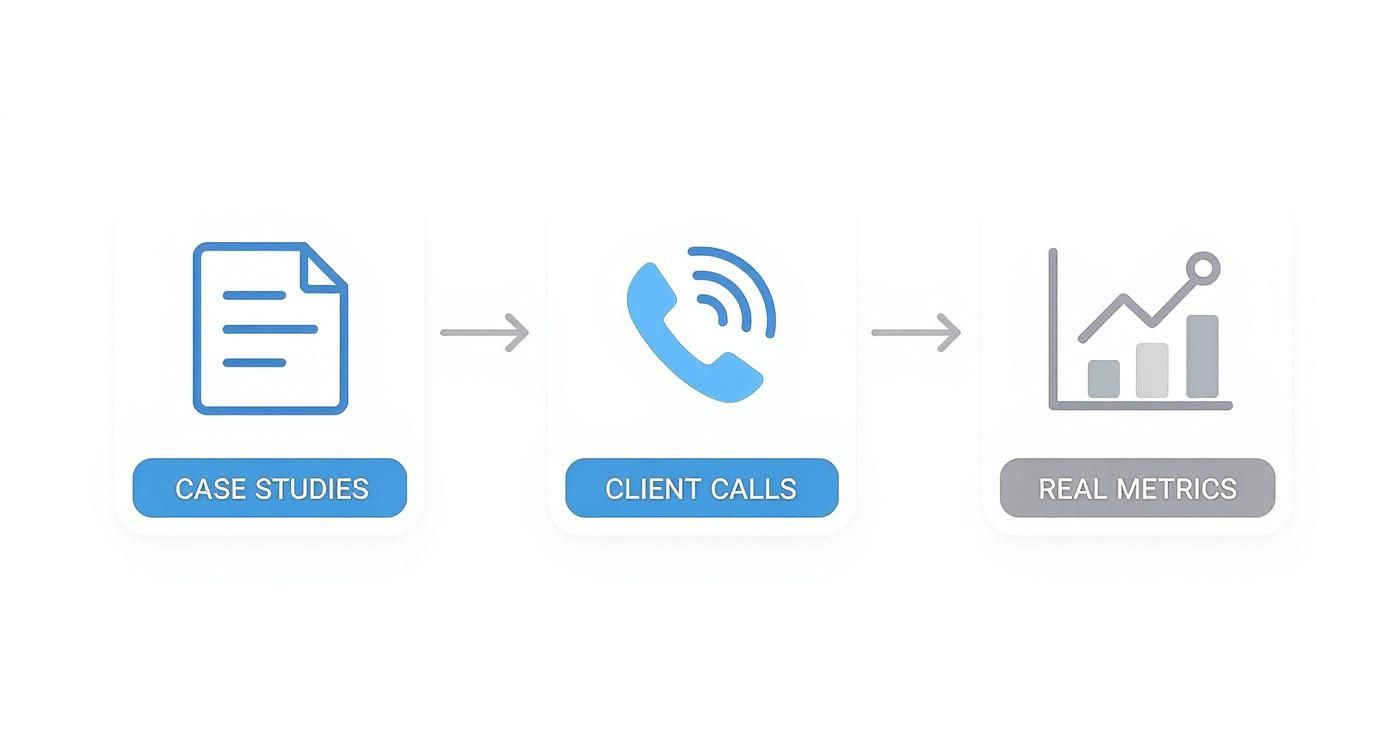Choosing the right digital marketing agency starts with a surprisingly simple first step: figuring out what you actually want to accomplish. Before you even think about looking at agency websites, you need to get crystal clear on your own business goals. We're talking specific, measurable numbers, like generating 150 qualified leads per quarter or boosting online sales by 30%.
This internal homework is your compass. Without it, you're just wandering through a sea of slick sales pitches, and you'll end up with a partner who talks a good game but doesn't deliver real business results.
Defining Your Goals Before You Start Your Search

Seriously, before you send a single email or hop on a discovery call, the most critical work happens inside your own four walls. So many businesses jump into the agency search with a vague wish like, "we need more traffic" or "we want to grow on social media." Those are fine starting points, but they aren't goals. They're wishes.
Without concrete targets, how can you possibly measure success? You're essentially hiring a guide without telling them your destination. It makes it far too easy to be wowed by a fancy presentation that has absolutely nothing to do with your core business needs. The whole process of choosing the right digital marketing agency hinges on building this solid foundation first.
Moving from Vague Desires to Concrete Business Objectives
The trick is to translate those broad ambitions into SMART goals—specific, measurable, achievable, relevant, and time-bound. This simple framework forces you to connect every marketing activity back to what actually matters: your bottom line.
Let's walk through a real-world scenario. A B2B SaaS company might start out wanting "more leads." That's not nearly specific enough. A much better, more actionable goal would look like this:
- Objective: Increase Marketing Qualified Leads (MQLs) by 25% every quarter for the next year.
- Key Result 1: Generate 150 MQLs from organic search in Q3.
- Key Result 2: Keep the cost per MQL under $150 from paid social campaigns.
See the difference? This level of detail instantly tells you what kind of agency you need—one with proven chops in B2B lead gen, SEO, and paid social.
Here’s another one. A local e-commerce shop selling handmade goods wants to "increase online sales." Let's sharpen that up:
- Objective: Grow total online revenue by 30% in the next six months.
- Key Result 1: Improve the website's conversion rate from 1.5% to 2.5%.
- Key Result 2: Hit a 4:1 Return on Ad Spend (ROAS) on all Google Shopping campaigns.
Armed with these specifics, you know you're looking for an agency that kills it at e-commerce conversion rate optimization (CRO) and has a killer track record with PPC for retail.
Key Takeaway: Your goals are the filter. Every potential agency gets run through this filter. If their core strengths don't line up perfectly with your specific objectives, they're not the right fit—no matter how impressive their portfolio looks.
Tying Goals to Your Target Audience
Well-defined goals are completely intertwined with a deep understanding of your ideal customer. You can't just decide you want 150 MQLs without knowing exactly who those people are, what keeps them up at night, and where they hang out online.
This is where creating detailed customer profiles, or buyer personas, becomes non-negotiable. Knowing your audience helps you and your future agency partner make smart decisions on where to focus your energy and budget. For example, if your ideal customers are C-suite executives, a thought leadership strategy on LinkedIn is probably a better bet than a TikTok dance challenge.
If you need to sharpen your focus here, our guide on how to create buyer personas is a great place to start.
When you take the time to define both your goals and your audience, you completely change the dynamic of the agency search. You’re no longer just hiring a vendor to do a task. You’re recruiting a strategic partner who already has the map to your destination. This clarity empowers you to ask smarter questions, judge proposals with a critical eye, and ultimately pick an agency that will feel like a true extension of your team.
Evaluating Agency Expertise and Specialization

The world of digital marketing is massive. Be wary of any agency that claims to be an expert at everything—it's a huge red flag. Your real mission is to find a partner whose core strength directly solves your most pressing business problem. This means separating the true specialists from the generalists who offer a bit of everything but master nothing.
If your primary goal is generating high-quality leads through paid search, you need an agency that lives and breathes Google Ads, not one that just treats it as a side gig. Likewise, if you're trying to rank for highly competitive keywords, you want a team obsessed with technical SEO, not a content firm that only dabbles in it.
Aligning your goals with their proven expertise isn't just important; it's non-negotiable.
Digging Deeper Than the Surface
Every agency will show you polished case studies and glowing testimonials. Your job is to look past the surface-level shine and really analyze the substance behind them. Don't just read the success story; deconstruct it.
Look for case studies that mirror your own situation. Do they feature clients in your industry, with similar budgets, or facing the same challenges you are? A success story for a national e-commerce giant means very little if you're a local service-based business.
When you find a case study that seems relevant, get specific with your questions:
- What was the exact timeline for achieving these results?
- Can you tell me the client's starting point (e.g., initial traffic, conversion rate)?
- Could you walk me through the specific strategies you implemented to get there?
This line of questioning does two things: it helps you understand their process and whether they can replicate that success for you, and it shows them you're a serious potential partner who understands the details.
Look for Specialization Signals
Genuine expertise leaves a trail. Beyond case studies, you need to look for other signals that an agency is a true specialist in the services you need most. This is especially critical as the market shifts.
For example, trends show a massive push toward paid advertising and AI integration. A 2025 report from Promethean Research found that 89% of agency leaders rank PPC as their core offering, with 68% predicting it will be the most effective channel. Even more telling, AI-related services have jumped from just 10% of offerings in 2023 to 17% in 2025, showing a clear direction for the industry. This data underscores the need to find an agency that isn't just competent but is actively leading in these high-impact areas.
A critical sign of specialization is an agency's ability to deliver in foundational areas like improving website SEO. An agency that can't demonstrate deep, technical knowledge here may struggle to deliver any kind of long-term organic growth.
Industry certifications can also be a strong signal. Look for credentials like Google Premier Partner, Meta Business Partner, or HubSpot Solutions Partner. These aren't just badges; they require agencies to meet tough performance, ad spend, and certification requirements. They prove the agency has invested in training and has been vetted by the platforms themselves.
Matching Goals to Specializations
To help you connect your business goals to the right kind of agency, here's a quick breakdown of common specializations and what you should be asking.
Key Agency Specializations and What to Look For
| Specialization Area | Primary Business Goal | Key Question to Ask Agency |
|---|---|---|
| Search Engine Optimization (SEO) | Increase organic traffic, improve search rankings, build long-term authority. | "Can you show me an example of how you improved rankings for a competitive, non-branded keyword?" |
| Pay-Per-Click (PPC) Advertising | Generate immediate leads, drive targeted traffic, achieve a specific ROAS. | "What's your process for optimizing ad spend and reducing cost-per-acquisition over time?" |
| Content Marketing | Build brand awareness, educate your audience, generate inbound leads. | "How do you measure the ROI of content beyond just traffic metrics?" |
| Social Media Marketing | Increase brand engagement, build a community, drive traffic from social channels. | "Which platforms do you recommend for our specific target audience, and why?" |
| Email Marketing & Automation | Nurture leads, increase customer lifetime value, drive repeat purchases. | "Can you walk me through a lead nurturing sequence you've built that turned cold leads into customers?" |
This table should give you a solid starting point for vetting agencies based on what you actually need to accomplish.
Ultimately, choosing an agency with the right specialization is like hiring a surgeon. You wouldn't ask a general practitioner to perform open-heart surgery. You find the expert with a proven track record in that specific procedure. Apply the same rigorous logic here, and you'll find a partner truly equipped to deliver the results you need.
And if you want to get really granular, check out our article on what it takes to be a top-tier data-driven marketing agency.
How to Vet an Agency’s Process and Communication

Fantastic results are only half the story. A truly great partnership is built on clear communication and a smooth, transparent process. If an agency’s internal workflow is a mess and their communication is spotty, you're signing up for a relationship filled with frustration, missed deadlines, and disappointing outcomes.
Looking at an agency's operational style is just as important as analyzing their case studies. You need to peek behind the curtain to understand how they actually work day-to-day. This foresight helps you avoid partnerships that look great on paper but are a nightmare in practice.
Understanding Their Onboarding and Strategy Development
The first 90 days with a new agency really set the tone. A top-tier agency will have a structured, detailed onboarding process designed to get deep into your business. They shouldn't just take your money and start running ads; they should become students of your brand.
Ask them to walk you through their typical onboarding journey. What does it actually look like?
- Discovery Phase: How do they dig into your brand voice, competitors, and past marketing efforts? What does that process involve?
- Technical Setup: What access will they need to your analytics, ad accounts, and website backend? Who is responsible for getting everything connected?
- Strategy Kickoff: When will they present their initial strategy, and what format does that presentation take? Is it a call, a deck, a formal report?
A vague answer here is a major red flag. A confident agency will have a well-defined playbook for getting new clients up to speed quickly and efficiently. This initial process reveals a ton about their organization and strategic depth before you even sign a contract.
Clarifying Your Main Point of Contact
Few things are more frustrating than being bounced around a generic support email when you have an urgent question. One of the most important things you can ask is who your dedicated point of contact will be. Will you have a single account manager who knows your business inside and out?
Having a dedicated account manager is a game-changer. This person acts as your internal champion, coordinating with the specialists (SEO, PPC, content) and translating complex data into clear, actionable insights for you.
When you're figuring out how to choose a digital marketing agency, the support structure is key. Find out how that relationship works. Will you have their direct line? Are weekly or bi-weekly calls standard? The difference between a dedicated partner and a faceless support desk can be the difference between success and failure.
Scrutinizing Their Reporting and Transparency
How an agency reports on progress speaks volumes about their commitment to transparency and accountability. A monthly PDF packed with vanity metrics like impressions and clicks just doesn't cut it anymore. You need access to data that connects their efforts to your bottom line.
Ask some pointed questions about their reporting style:
- What metrics do you prioritize? Do they focus on business-critical KPIs like Cost Per Acquisition (CPA), Return on Ad Spend (ROAS), and Customer Lifetime Value (CLV), or just top-of-funnel numbers?
- How often will we receive reports? Is reporting weekly, bi-weekly, or monthly? A good cadence keeps you informed without overwhelming you.
- What format does reporting take? Do they offer real-time dashboards (like Looker Studio) where you can check performance anytime, or is it just a static report?
Modern, data-driven agencies lean toward transparency with shared dashboards. It shows they have nothing to hide and are confident in their ability to perform. To get a better handle on this, it's a good idea to learn more about how to measure digital marketing success so you know what to look for.
Finally, don't underestimate the importance of cultural fit. Is their team's communication style formal and corporate, or more relaxed and collaborative? Choosing a partner whose style complements your own ensures a smoother, more productive, and ultimately more enjoyable long-term relationship.
How to Assess Their Track Record and Past Results
Every agency is going to tell you they can deliver amazing results. That’s their job. Your job is to find the hard proof.
A slick presentation is one thing; a documented history of success is something else entirely. This is where you have to put on your detective hat and move past the sales pitch to verify their actual performance. It's not just about looking at their wins, either. It’s about finding evidence that they’ve won for clients just like you. A huge victory for a Fortune 500 company doesn't mean a thing if they don't understand the gritty realities of a local service business.
Go Beyond Polished Case Studies
Any agency worth its salt will have a portfolio of case studies ready to go. But don't just skim the impressive headlines and big numbers. You need to deconstruct them to see if their success is even relevant to your goals.
Start by asking for case studies from clients who faced challenges similar to yours—whether that’s breaking into a crowded market, wrestling down customer acquisition costs, or generating better quality leads in a specific industry. Once you have a relevant example, start digging deeper with some targeted questions:
- What was the client’s starting point before you began work? What were the actual numbers?
- Can you walk me through the specific strategies that led to these results?
- What was the timeline from project start to achieving these key milestones?
This line of questioning does two things: it helps you understand their strategic thinking and shows you whether their process is a good fit for your business.
Scrutinize the Metrics They Present
This is probably the most critical part of your evaluation. Not all metrics are created equal, and a clever agency can easily hide so-so performance behind impressive-sounding "vanity metrics."
Are they celebrating a huge jump in website traffic or a million social media impressions? That’s nice, but it means absolutely nothing if it didn’t lead to more sales or qualified leads. You need to make sure their definition of success lines up with yours. For instance, is their idea of a "lead" the same as your sales team's?
Your focus should be on business-critical numbers. Ask about Return on Ad Spend (ROAS), Customer Lifetime Value (CLV), and Cost Per Acquisition (CPA). An agency that confidently reports on these metrics is one that ties its work directly to your bottom line.
Understanding their approach to accountability is vital. For example, knowing how to measure content marketing ROI is crucial for evaluating their performance and ensuring your investment is actually paying off.
Talk to Their Past and Current Clients
Case studies are the agency's version of the story. Client references? That's the unfiltered truth. Don't be shy about asking for two or three references—ideally, one current and one past client to get a balanced perspective.
Once you have them on the phone, ask questions that get beyond a simple "Yeah, they were great."
- How was their communication and project management? This tells you about the day-to-day reality of working with them.
- How did they handle challenges or unexpected results? Every campaign hits a few bumps. You want a partner who is proactive and transparent when things don’t go according to plan.
- Would you hire them again for a similar project? This is the ultimate test of satisfaction.
The Digital Advertising Agencies industry in the United States hit a market size of $58.2 billion in 2025, with a compound annual growth rate of 13.6% over the last five years. This explosion means more agencies are flooding the market, making it absolutely essential to pick one with proven experience that can deliver consistent results. Learn more about the growth of the digital advertising industry from IBISWorld.
Decoding Contracts and Pricing Models
Alright, you’ve done the hard work. You’ve grilled agencies on their expertise, poked holes in their case studies, and you’re feeling good about their process. Now comes the final boss: the contract and pricing.
This is the part where a lot of people get intimidated and just skim the document, but it’s arguably one of the most critical steps. Getting the contract right sets the tone for the entire relationship. It prevents those awkward “I thought that was included” conversations down the road and makes sure everyone is on the same page from day one.
An agency’s pricing model isn’t just about the money; it’s a window into how they operate and value their partnerships. Let's break down the common structures you'll encounter so you can figure out what actually works for your business.
Getting a Handle on Agency Pricing
Agency pricing isn't one-size-fits-all. It usually breaks down into a few common models, and the "best" one really just depends on your goals, budget, and how you like to work.
Here’s a look at the typical agency pricing models I see most often:
-
Monthly Retainer: This is the bread and butter for most agencies. You pay a set fee every month for a specific list of ongoing services—think SEO, content marketing, or social media management. It’s predictable, which is great for budgeting, and perfect for long-term strategies where consistency is key.
-
Project-Based Fee: Got a single, defined task with a clear start and end? A project-based fee makes the most sense. This is common for things like a website redesign or launching a new product campaign. You agree on one fixed price for the whole shebang.
-
Hourly Rate: Some agencies bill by the hour, especially for consulting, training, or smaller, ad-hoc tasks that are hard to scope out. It offers a ton of flexibility, but you have to be careful. Costs can spiral if the project scope isn't managed with an iron fist.
-
Performance-Based Pricing: This is where the agency puts its money where its mouth is. Their pay is tied directly to hitting specific goals, like generating a certain number of leads or achieving a target ROAS. It’s a great way to align incentives, but it often comes with a higher base fee to offset the agency’s risk.
The infographic below touches on why verifying an agency's past performance is so crucial. If an agency can't prove they've delivered results before, you have to question the value you're getting from any pricing model you agree to.

Once you’re confident they can walk the walk, you can feel much better about the investment you're about to make.
Before we get into the nitty-gritty of contracts, it helps to see these pricing models laid out side-by-side. Each one has its place, depending on what you're trying to accomplish.
Common Agency Pricing Models Compared
| Pricing Model | How It Works | Best For | Potential Downside |
|---|---|---|---|
| Monthly Retainer | A fixed monthly fee for a recurring scope of work (e.g., SEO, content, social media). | Long-term, ongoing strategies that require consistent effort and a dedicated team. | Can feel expensive during slower months; scope creep can be an issue if not clearly defined. |
| Project-Based | A single, flat fee for a well-defined project with a clear start and end (e.g., website build). | One-off projects where the deliverables are crystal clear from the beginning. | Inflexible if the project scope needs to change midway through. |
| Hourly Rate | Paying for the agency's time at a set hourly rate. Billed as work is completed. | Consulting, training, or small, unpredictable tasks where scoping is difficult. | Can lead to unpredictable costs and budget overruns if not managed closely. |
| Performance-Based | Agency fees are tied directly to achieving specific, measurable KPIs (e.g., leads, sales, ROAS). | Businesses with clear, trackable conversion goals who want to directly link cost to results. | Can be complex to structure and often requires a higher base fee or a larger ad spend. |
Ultimately, the right pricing model is the one that aligns with your budget and business objectives. A good agency will be able to explain why they use a particular model and how it benefits you as the client.
What to Look For in the Contract Fine Print
The contract, often called a Statement of Work (SOW), is the rulebook for your partnership. Don't just give it a quick glance—read every single line. This document should spell everything out so there’s no confusion later on.
Honestly, a solid, detailed contract is a green flag. It shows the agency is professional and transparent. If they’re cagey about putting things in writing, you should be concerned.
Here’s a quick checklist of things I always look for before signing anything:
-
A Super-Detailed Scope of Work: The SOW needs to be specific. Vague promises are a recipe for disaster. If it’s SEO, does it list technical audits, keyword research, on-page optimization, and link building? If it's PPC, does it specify campaign setup, ad copywriting, management, and reporting frequency? Get it all in writing.
-
Who Owns What: This is a huge one. The contract must state, in no uncertain terms, that you own all the work and data. This includes creative assets like logos and ad copy, as well as your analytics history and ad accounts. You should never be in a position where an agency can hold your accounts hostage if you decide to part ways.
-
The Escape Hatch (Termination Clause): What happens if it's just not working out? A fair contract will always have a clear termination clause. A 30- to 60-day written notice is pretty standard. Be very skeptical of any contract that tries to lock you into a long-term commitment with no easy way out.
-
Reporting and Communication: How and when will you hear from them? The contract should lock this down. Will you get weekly or monthly reports? Who is your main point of contact, and how often will you have scheduled calls? Setting these expectations upfront saves a lot of headaches.
Pro Tip: Always ask about costs that aren't covered in the main fee. Things like third-party software licenses (Ahrefs, Semrush), ad spend, or stock photo licenses can add up. A trustworthy agency will be completely upfront about these extra expenses.
By taking the time to really understand the pricing and the contract, you're not just hiring a vendor; you're building a partnership on a foundation of trust and clarity. This final step ensures the agency you choose is not only a talented marketer but also a solid business partner ready to help you grow.
Still Have Questions About Choosing an Agency?
Even after you've done your homework, it’s totally normal to have a few last questions nagging at you. Picking a digital marketing partner is a big decision, and getting these final points ironed out can give you the confidence to sign on the dotted line.
Think of this as your final gut check. We’ll run through the most common questions we hear from businesses right before they’re about to hire an agency.
How Much Should I Expect to Pay for a Digital Marketing Agency?
This is the big one, right? The honest answer is: it’s all over the map. You can find basic, single-service packages starting around $1,000 per month, while a full-blown, multi-channel strategy can easily top $20,000 per month.
Instead of looking for a magic number, a better approach is to allocate a percentage of your total revenue to marketing—a healthy range is usually 10-20%. From there, you can figure out how much of that budget makes sense to invest in an agency, depending on what you need them to do.
Should I Choose a Niche Agency or a Full-Service One?
This really comes down to what you need right now. A niche agency that lives and breathes one specific thing, like technical SEO or advanced Google Ads management, brings a massive amount of focused expertise. If your single biggest growth opportunity is mastering one channel, going with a specialist is often the smartest play.
On the other hand, a full-service agency is your best bet if you need a unified strategy across multiple channels—say, SEO, content, and social media—and you don’t have the in-house team to stitch it all together. They become the strategic brain for your entire digital footprint.
The real question isn't which type of agency is "better," but which is a better fit for where your business is today. A startup desperate for quick leads might get the most out of a PPC specialist, while a more established brand probably needs the integrated approach of a full-service partner to keep growing.
What Are the Biggest Red Flags When Hiring an Agency?
Knowing what to avoid is just as critical as knowing what to look for. Keep your radar up for these warning signs as you talk to potential partners:
- Guarantees of specific results: If an agency promises you things like "#1 Google rankings" or a set number of leads, run. Digital marketing just doesn't work that way, and anyone making those kinds of promises is either naive or dishonest.
- Proposals full of fluff: A good proposal is a clear, detailed plan of action. If what you get is loaded with buzzwords but light on concrete deliverables, timelines, and KPIs, that’s a huge red flag.
- A lack of transparency: A partner you can trust will be an open book about their process, pricing, and even their mistakes. If they get dodgy when you ask about their methods or how they report on performance, it’s a sign they might have something to hide.
- High-pressure sales tactics: A truly confident agency knows their value and won’t need to bully you into a quick decision. They’ll give you the space and information you need to make the right choice.
How Long Does It Take to See Results from an Agency?
Patience is a virtue here, but the timeline really depends on the services in play. With something like Pay-Per-Click (PPC) advertising, you can start seeing traffic, data, and even some leads roll in within the first one to three months. It’s designed for more immediate feedback.
For organic strategies, you’re playing the long game. It usually takes a solid six to twelve months to see a significant, lasting impact from SEO and content marketing. A good agency will be upfront about these timelines from day one and set clear expectations for both short-term progress markers and long-term business growth.
Ready to partner with an agency that delivers real, measurable growth? Up North Media offers data-driven SEO, custom web app development, and AI consulting to help businesses like yours accelerate revenue and dominate their markets. Schedule your free consultation today.
